We’re counting down Glen Sather’s Top Ten Trades as General Manager of the New York Rangers. If you missed Part One, be sure to check it out here and see the trades that brought us up to Number 5 in the countdown. On we go…
#5 – Boyle-ing Over
2000 3rd Round Pick (Jordan Weal) to Los Angeles Kings for Brian Boyle
June 27, 2009
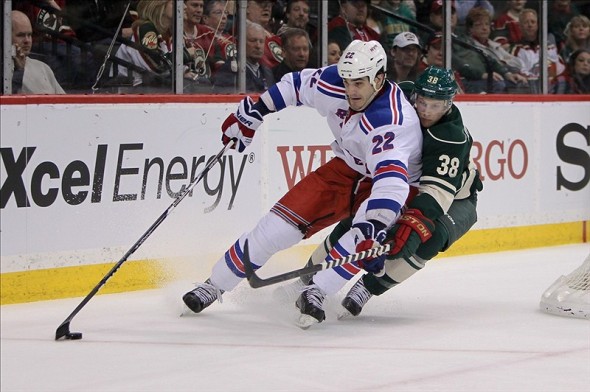
Standing at the draft table at the Bell Center in Montreal in 2009, Glen Sather made a seemingly minor deal that went on to pay dividends for his club. Brian Boyle had spent parts of two seasons with the Los Angeles Kings, scoring a combined eight goals in 36 games. The former first round draft pick put up solid numbers in the AHL, leading the Manchester Monarchs in scoring, but just couldn’t seem to find his game at the NHL level.
Glen Sather decided to give the 6’7” forward a shot, sending a 2010 third round draft pick back the other way. Boyle’s first season in New York was comparable to his last in Los Angeles. A bottom six forward, he chipped in four goals in a serviceable role. After the season, Boyle worked with skating coach Barb Underhill who revolutionized his game. He scored a career-high 21 goals and 35 points in 2010-11, also becoming a key presence on the Rangers’ penalty killing unit. He finished fourth on the team in scoring and led the Rangers in shots on goal. He remains a solid, reliable, physical presence in New York.
As for the draft pick, the Kings selected 5’9”, 173 pound forward Jordan Weal. In 2012-13, the 21-year-old has finally put up some points with the Manchester Monarchs of the AHL, with six goals and ten points in 31 games this season.
#4 – Trading Up for Staal
Sending first and second-round picks to Atlanta to move up and draft Marc Staal
July 30, 2005
Rangers General Manager Glen Sather was wheeling and dealing at the 2005 Entry Draft. The team had defenseman Marc Staal pegged as a top-five pick. Sather started shopping around, and finally found a willing trade partner in the Atlanta Thrashers. They’d just traded down with the Sharks, giving up the eighth overall pick for the Sharks’ 12th overall, plus second- and seventh-round picks. Sather convinced Atlanta GM Don Waddell to trade the 12th overall pick to the Rangers in return for the Rangers’ first (16th overall) and second round selections.

The Rangers were able to get the blueliner they wanted in Marc Staal. He spent a few years developing in juniors, earning plenty of ice time and winning individual awards as well as two gold medals at the World Junior Championships. Joining the Rangers in 2007, Staal had an immediate impact in the lineup. He remains a solid, steady presence on the blueline as a top shutdown defenseman.
What about the draft picks the Rangers traded away? With the 16th overall selection, the Thrashers drafted Alex Bourret. The highly-touted forward was not able to translate his Quebec Major Junior success to higher levels. He was unimpressive in the AHL, falling even to the ECHL. He has not yet suited up for an NHL game.
The second round pick given up by the Rangers worked out considerably better for the Thrashers. Current Jets starting goaltender Ondrej Pavelec was tapped at that spot.
#3 – Moves Like Jagr
Anson Carter to Washington for Jaromir Jagr
January 24, 2004
Anson Carter was in the midst of his second-straight 25-goal season when he was traded from the Edmonton Oilers to the Rangers. When he got to the Big Apple, his production dropped off dramatically. He put up only 11 goals in 54 games in New York – a pace of 0.20 goals per game, his lowest since his rookie season with the Capitals.
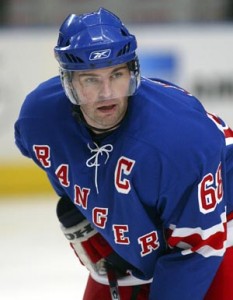
With the Washington Capitals, Jaromir Jagr battled injuries and scoring slumps in trying to maintain the scoring pace he showed in Pittsburgh. His performance though, wasn’t the major issue. At nearly a point per game, Jagr was still putting numbers on the score sheet. The issue for the Capitals was financial.
The team was already losing money – reportedly $20 million a season. Making things worse was Jagr’s massive seven-year, $77 million contract. General Manager George McPhee and owner Ted Leonsis were happy to cut their losses and send Jagr packing. With the salary cap era not yet underway, Glen Sather leveraged the Rangers’ deep pockets to acquire the five-time NHL scoring leader. At the time of the deal, Jagr was scheduled to make $44 million over the next four years. Washington agreed to remain on the hook for nearly half of that amount.
Jagr joined a Rangers team that looked like a 1996 All-Star lineup, boasting Mark Messier, Brian Leetch, Eric Lindros, Bobby Holik, and Petr Nedved. The collection of aging veterans failed to make the playoffs and the team was dismantled. The lockout followed, and a revamped Rangers team took to the ice in 2005.
The post-lockout Rangers had a completely new look. They had undergone dramatic changes to fit under the salary cap. Jagr, after spending the lockout in the Czech League and Russian Superleague, came back ready to play. He led a Czech-filled roster to the Rangers’ first playoff appearance in nine years, breaking team scoring records along the way. Jagr set team bests in goals (54), points (123), and power play goals (24). The Rangers would go on to make the playoffs for the remainder of Jagr’s time with the club, twice making it to the second round. Anson Carter was a solid player throughout his ten-year NHL career, but trading him for one of the all-time best NHLers – who gave one of the best Rangers single-season performances – was a no-brainer.
#2 – New York Becomes Nashville
Brandon Dubinsky, Artem Anisimov, Tim Erixon and a first-round pick to Columbus for Rick Nash
July 23, 2010
Rick Nash’s arrival is the latest move by Glen Sather in his attempt to bring another Stanley Cup to New York. Sending Brandon Dubinsky, Artem Anismov, Tim Erixon, and a first-round draft pick to Columbus in return for the star winger, Sather has succeeded in yet again bringing another high-profile player to the bright lights of the big city.
The wheels started turning on this deal nearly six months before it finally happened. After failing to move the star winger at the trade deadline, Blue Jackets’ GM Scott Howson told the media that Nash had requested a trade back in January. The New York Rangers figured to make a play, but were unwilling to part with talented prospect Chris Kreider or one of their defensemen, who were rumored to be part of the Blue Jackets’ demands. Instead, Sather pulled the trigger in the offseason, giving up a reasonable package to land the star winger.
Here’s Nash’s first goal as a Blueshirt. Hopefully, the first of many:
http://www.youtube.com/watch?v=75VbVxP1x9s
#1 – The Bob Gainey Special
Scott Gomez, Tom Pyatt, and Michael Busto to Montreal for Ryan McDonagh, Chris Higgins, Pavel Valentenko, and Doug Janik
June 30, 2009
It’s no surprise that Glen Sather’s best trade in New York was as much about what he got in return as about what he gave away.
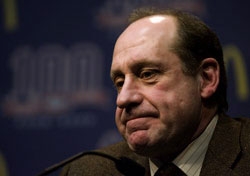
Rangers GM Glen Sather went on a shopping spree in the summer of 2007, signing two of the top prized free agents, Chris Drury and Scott Gomez. Two years later, it was obvious things weren’t working out.
Gomez was coming off his lowest-scoring season in six years. New head coach John Tortorella ran a much tighter ship than the ousted Tom Renney, and it appeared Gomez was having a hard time fitting in to his system or working with his approach. While the team squeaked in to the playoffs – falling to the Capitals in seven games – Glen Sather knew he needed to shake things up. Gomez had to go.
Thanks to the 2005 Collective Bargaining Agreement introduced the salary cap to the NHL. In prior years, Sather would have gone out and freely signed players. Unfortunately, the outlandish contracts he’d awarded to Gomez and Drury prevented the Rangers from making any big moves.
That is, until Montreal Canadiens GM Bob Gainey picked up the phone.
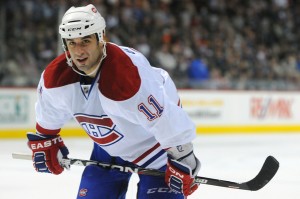
Gainey wanted a big center in Montreal. He tried for former Leaf Mats Sundin, but couldn’t bring him to Quebec. Rumors swirled that the team would try to make a play for the Tampa Bay Lightning’s Vincent Lecavalier, but a deal never materialized. Somehow, Sather convinced Gainey that Gomez could be the center he was looking for.
Gainey looked at the Gomez acquisition as a key part of his rebuilding project. He also lured free agents Brian Gionta, Mike Cammalleri, Jaroslav Spacek, and Hall Gill to the team. Gomez, already on the decline in New York, continued his slide in Montreal.
He managed a respectable 59 points in his first year with the Canadiens before plummeting to 38 the following season. Injuries contributed to his career-low 11 points in 2011-12, a season that included a year-long goalless drought. Gomez was finally – mercifully – bought out by the Canadiens prior to the start of the 2013 season. He’s since signed on with the San Jose Sharks to try to rediscover his game.
On the Canadiens’ side, Tom Pyatt found a spot in their lineup. A bottom-six forward, he scored a total of four goals and eight assists in 101 games with the Habs. In 2011, he signed with the Tampa Bay Lightning as an unrestricted free agent. That season, he posted career highs in goals (12), assists (7), and points (19).
Michael Busto spent some time in the ECHL and is currently overseas, playing for Les Ducs D’Angers of the French League.
The Rangers won this trade by a landslide. Getting the massive contract off his books was a win in itself, but the fact that Sather actually negotiated a return package that included solid prospects was shocking.
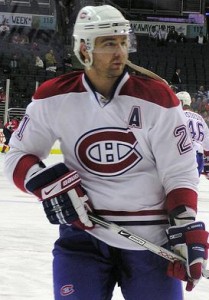
Chris Higgins was wearing out his welcome in Montreal. The team was underwhelmed his recent performance. The New York native was a season removed from his career best 27 goals in 2007-08. Fearing he’d continue his decline, he was shipped off to the Rangers. Higgins played 55 games with the Rangers before being traded to Calgary as part of the deal that brought Brandon Prust and Olli Jokinen to New York. (See #7 in our countdown)
McDonagh, the Habs’ 2007 first round draft pick, played one more season under head coach Mike Eaves at the University of Wisconsin before signing his first professional contract with the Rangers. After only 38 games in the AHL, he was called up to make his NHL debut in New York. He’s been improving ever since. He’s claimed a spot on the Rangers’ top defensive pairing, where he’s averaged nearly 25 minutes of ice time per game. Last season, he posted respectable scoring numbers, with seven goals and 25 assists in a full 82 games.
The Montreal Gazette reported on the possible reason behind McDonagh’s inclusion in the trade:
McDonagh had three solid seasons as a stay-at-home defenceman at Wisconsin but, as the story goes, he had one not-so-impressive night and Gainey happened to be in attendance. Trevor Timmins, the man who directs the Canadiens’ amateur scouting, pleaded for the team to keep McDonagh but he was overruled.
Pavel Valentenko remained a part of the Rangers organization until this past fall, when he signed a two-year deal with Avangard Omsk of the KHL.
Janik went unsigned by the Rangers. He later joined the Detroit Red Wings, where he played 29 games over parts of three seasons. He scored a career total of three goals and 16 assists in the NHL. Janik is currently suiting up with Adler Mannheim of the German League.
Oh, and all that cap space the team cleared up by making the trade? They used it rather effectively. The day after the Gomez deal, the Rangers signed talented winger Marian Gaborik to a five-year contract that would pay him $7.5 million per season – $500,000 less than Gomez earned that year. In the nearly-four years since the trade/signing, Gaborik has scored 110 goals. Gomez has only 21.

Agree? Disagree? Any spectacular trades that you think we missed? Let us know in the comments.